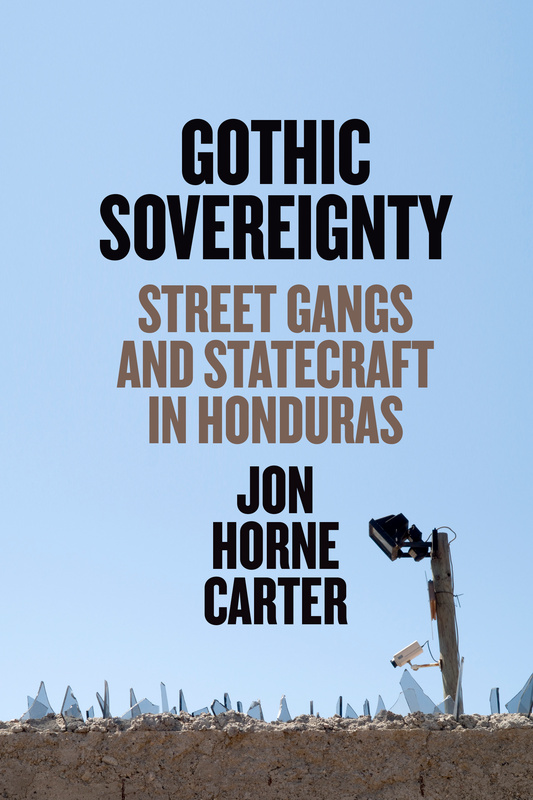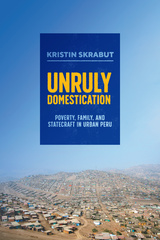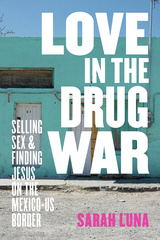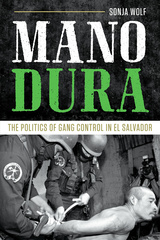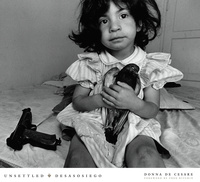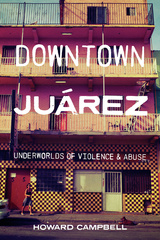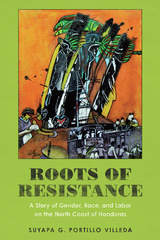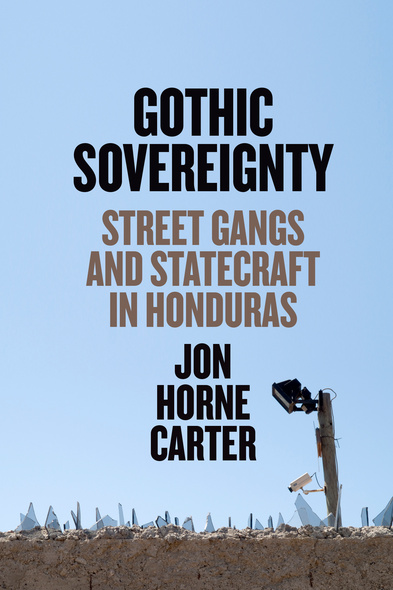
Gothic Sovereignty
Street Gangs and Statecraft in Honduras
Gang-related violence has forced thousands of Hondurans to flee their country, leaving behind everything as refugees and undocumented migrants abroad. To uncover how this happened, Jon Carter looks back to the mid-2000s, when neighborhood gangs were scrambling to survive state violence and mass incarceration, locating there a critique of neoliberal globalization and state corruption that foreshadows Honduras’s current crises.
Carter begins with the story of a thirteen-year-old gang member accused in the murder of an undercover DEA agent, asking how the nation’s seductive criminal underworld has transformed the lives of young people. He then widens the lens to describe a history of imperialism and corruption that shaped this underworld—from Cold War counterinsurgency to the “War on Drugs” to the near-impunity of white-collar crime—as he follows local gangs who embrace new trades in the illicit economy. Carter describes the gangs’ transformation from neighborhood groups to sprawling criminal societies, even in the National Penitentiary, where they have become political as much as criminal communities. Gothic Sovereignty reveals not only how the revolutionary potential of gangs was lost when they merged with powerful cartels but also how close analysis of criminal communities enables profound reflection on the economic, legal, and existential discontents of globalization in late liberal nation-states.
[An] ethnography noir of the drug economy in Honduras...Carter introduces us to dizzying conspiracies and a lurid cast of characters that make the Hollywood treatment of the subject matter, like Netflix’s Narcos, seem tame...Readers who approach this book with an interest in understanding the cultural forms and aesthetics surrounding gang life in Central America will certainly learn a great deal. Others will come to this book with more of an interest in the complex vectors of the drugs and arms underworld, and they will be rewarded by an alternative political mapping of this world.
Gothic Sovereignty offers a nuanced anthropological analysis of pervasive gang violence in Honduras, which transcends narrow sociological approaches to organized crime and state corruption in Central America...Gothic Sovereignty will appeal to students of the anthropology of crime, aesthetics, and Latin American political history...Recommended.
[Gothic Sovereignty] builds on a critical framework centered on the writing of Walter Benjamin, offering a nuanced critic’s reading of the experience of gang activity in that country. Carter presents a deep analysis of various aspects of gang activity...These are important interventions in the debate on gangs in Latin America. Acknowledging the critical aesthetics of sovereignty in Honduras and how gangs reflect a challenge to that is an insightful contribution to understanding the implications of gang activity for state power and the ways that violence and governance are practiced that goes beyond much of the existing scholarship.
Gothic Sovereignty is a fascinating read about street gangs and the state in Honduras...Carter is to be lauded for completing an important study that was difficult to finish...Carter’s study warrants analysis by both specialists and the public...If you are interested in political and legal anthropology or the study of organised crime in Central America, I highly recommend [Gothic Sovereignty].
What is most remarkable about this book, however, is how little violence it actually holds. Carter does an extraordinary job of writing about violent acts and violent actors without reproducing that violence . . . Gothic Sovereignty is an exemplary anthropology, as it is at once method, theory, argument, narrative, positioned reflexivity, and a bit of memoir. The text is theoretically rich, expecting a sophisticated facility with social theory from the reader.
Throughout [Gothic Sovereignty], Carter's writing moves fluidly between the safe haven of high theory and the thick fever of barrio life with a momentum that reads like a novel. His ethnographic fieldwork is immersive, making use of 'dissident' surrealist Georges Bataille's theories of waste and purposelessness, here applied as a methodology to allow Carter's research to come to him. In other words, he lets chance determine the course of the work.
This is a diabolically original book about urban worlds, carcerality, US militarized imperialism, elites vampirizing young people’s energy and hopelessness, and the rippling creativity of those young people and their communities. Jon Carter writes with great artistry, rage, and compassion about Hondurans seeking to walk away from lives made barely livable by the baroque grotesqueries of the illicit webs of extraction woven about them. By terms heartbreaking and heart-pounding, Gothic Sovereignty is theoretically nimble and ethnographically rich. Deeply respectful of lived complexities, it offers profane visions and counterintuitive methods for understanding the unfolding worlds in which we are all enmeshed.
Jon Carter engages with hypervisible gang violence in Honduras by moving slowly and with deliberate understatement, using a grounded theory approach to build a subtle string of observations into powerful considerations of violence, debilitating injury, and death. He avoids the familiar analytics of ‘deviance’ and ‘pathology' that can become realities of their own, too often foreclosing the possibility of social change. By delving into a ‘prehistory’ of gang formation in Honduras, Carter takes on the institutional violence that opens the way for political transformation and future making. This book will be widely read and will resonate beyond anthropology.
- Preface
- A Note on Translations and Anonymization
- Introduction
- Part I. Angels
- Chapter 1. Flash
- Chapter 2. Baroque
- Chapter 3. Allegory
- Chapter 4. Image
- Chapter 5. Danger
- Part II. Devils
- Chapter 6. Underworld
- Chapter 7. Dragons
- Chapter 8. Crime
- Chapter 9. Storm
- Chapter 10. Rubbish
- Chapter 11. Evil
- Chapter 12. Corruption
- Chapter 13. Lumpen
- Part III: Justice
- Chapter 14. Community
- Chapter 15. Sovereignty
- Chapter 16. Apocalypse
- Chapter 17. Trust
- Chapter 18. Futures
- Afterword
- Acknowledgments
- Notes
- Index

